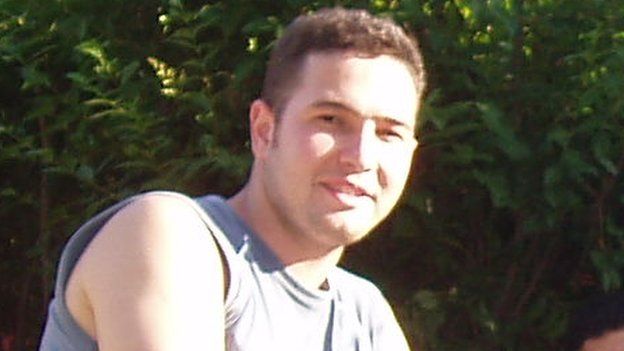Jean Charles de Menezes family in European court challenge
- Published

The family of a Brazilian man shot dead in London by police who thought he was a suicide bomber have taken their legal battle to the European Court of Human Rights.
Jean Charles de Menezes was shot at Stockwell Tube station after being mistaken for a terror suspect.
His family are challenging a decision not to prosecute anyone for murder over the electrician's July 2005 death.
Lawyers are putting the family's case against the UK before the judges.
They argue the assessment used by prosecutors in deciding no-one should be charged is incompatible with Article 2 of the European Convention on Human Rights, which covers the right to life.
They claim the test applied by the Crown Prosecution Service - that there should be sufficient evidence for a "realistic prospect" of conviction - is too high a threshold.
The CPS ruled out prosecuting officers in 2006, but they did charge the Met Police with breaching health and safety laws, leading to a £175,000 fine.
An inquest jury later returned an open verdict after being told by the coroner they could not conclude Mr de Menezes had been unlawfully killed.
The Strasbourg case was lodged by Patricia da Silva, a cousin of Mr de Menezes, who was 27 when he died.
Hugh Southey QC, representing the family, told the court he would argue that previous investigations into the death did not satisfy the requirements of Article 2.
What is Article 2?
In short, the article says the state must never arbitrarily take someone's life, and must also safeguard the lives of those in its care.
It lists three scenarios where force at the hands of the state could be justified:
- In defence of any person from unlawful violence
- In order to effect a lawful arrest or to prevent the escape of a person lawfully detained
- In action lawfully taken for the purpose of quelling a riot or insurrection.
It also requires the government to carry out a independent investigation into all deaths caused by the state. This investigation must be brought about by the state of its own accord, and include an element of public scrutiny.
Mr Southey said: "We submit that the legal test does not correspond to Article 2 and fails to hold the officers to account. The investigation did not satisfy Article 2, it does not justify that the shooting was lawful.
"If the public don't believe that officers may be held to account, the order of the law is called into question."
Mr de Menezes was shot amid an operation to hunt down the men responsible for the failed suicide bombings of 21 July 2005 in London - attacks that came after the deaths of 52 people in four similar explosions two weeks earlier.
Representing the UK, Clare Montgomery QC, told the court that in the aftermath of the London bombings there was "huge pressure on the officers".
She said while it was recognised they had failed in their "duty of care" to Mr Menezes, none of the mistakes they made "amounted to gross negligence or manslaughter".
Undercover police officers began following Mr de Menezes because they thought he looked like one of the bombers who was on the run, and he lived in a flat that shared a communal entrance with another linked to the suspect.
They followed him into the station where he was pinned down and shot seven times in the head and once in the shoulder by two officers trained in stopping suicide bombers.
Analysis
Dominic Casciani, BBC home affairs correspondent
Article 2 of the European Convention requires a proper investigation into a death when the state is involved. In the UK, that usually means an inquest or, in Scotland, a fatal accident inquiry.
But the de Menezes family say that the CPS denied them that full investigation by refusing to prosecute anyone for murder.
The CPS said there was no realistic prospect of a conviction - and it is that well-established legal test for criminal prosecutions in the UK that is under attack in this European Court case.
The Grand Chamber's judgement will be many months away - but a decision against the UK could have profound implications for how the CPS decides who goes on trial.
So what's at stake in this case is not just the outcome of a long-fought family campaign - but, potentially, a key part of the prosecution system itself.
Ms da Silva said: "For 10 years our family has been campaigning for justice for Jean because we believe that police officers should have been held to account for his killing.
"Jean's death is a pain that never goes away for us.
"Nothing can bring him back, but we hope that this legal challenge will change the law so that no other family has to face what we did."
Family spokesperson Yasmin Khan: "The family believe there was plenty of evidence that came out in the inquest that could have led to successful prosecutions"
Legal timeline
- 22 July 2005: Shot dead by police at Stockwell Tube station
- 17 July 2006: CPS says no officers will be prosecuted, but Met Police will be tried for breaching health and safety laws
- 1 November 2007: Met Police found guilty of breaching health and safety laws and fined
- 22 October 2008: Inquest under way - coroner rules out unlawful killing verdict a month later
- 12 December 2008: Inquest jury returns open verdict
- 16 November 2009: Met Police settles damages claim with family
- Published10 June 2015
- Published23 November 2009
- Published12 December 2008
- Published1 November 2007